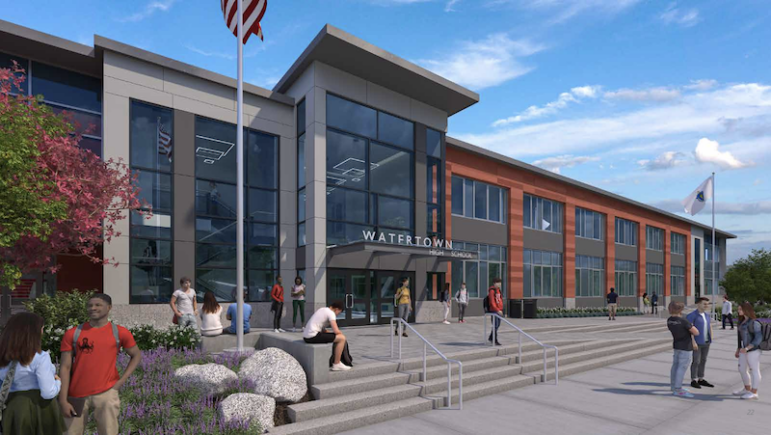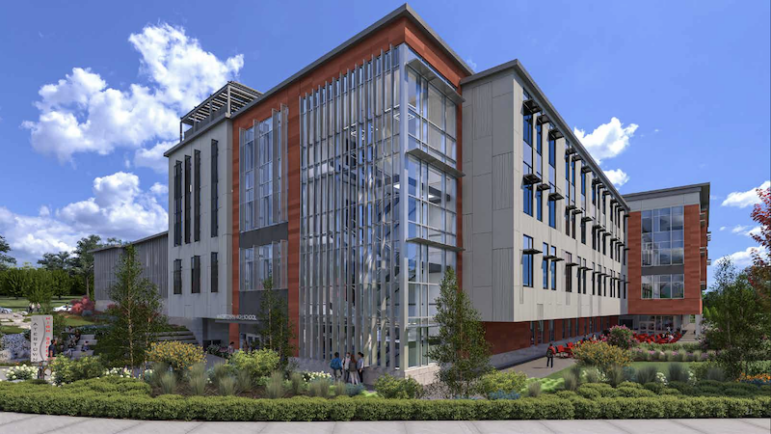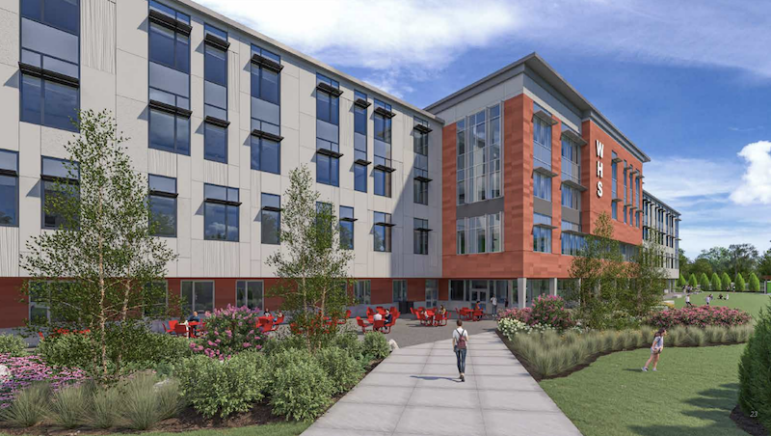
Ai3 Architects A rendering of the designs for the new Watertown High School viewed from Columbia Street.
Soaring construction prices have pushed the cost of the new Watertown High School millions above the original estimate, but City Manager George Proakis committed to getting the school built without sacrificing the educational program or the net zero energy design.
During his Fiscal Year 2024 Watertown budget presentation on May 9, Proakis gave the City Council an update on the WHS project, and some of the imperfect options for paying for the cost increase.
When the Council approved the WHS project in June 2021, the price tag was $198 million. That figure includes building a temporary high school site at Moxley Field and making the school net zero (producing enough energy to cover the amount used by the building). The District will get $50 million from the State as part of being in the Massachusetts School Building Authority program.
The latest cost estimate came in at $219 million, including the solar panels to make the school net zero, Proakis said, and on May 3 the subcontractor bids came in $14.5 million over the estimate.
“The good news is we have $11 million in the (high school) stabilization fund if the Council approves the $3 million (for Fiscal Year 2024),” Proakis said. “The bad news is we may have a budget gap of $10 million.”
Ai3 Architects
A view of the designs for the new Watertown High School from Common Street.
Proakis provided some options for closing the project’s budget gap, but even facing the shortfall he told the Council he does not want to do anything that will have a long-term negative effect.
“One thing I don’t want to put on this list is anything that would impact the educational program,” Proakis said. “It is just something that is not an option to remove something from this building that five years from now we would be shaking our heads going, why did we take that classroom out? Or, why did we make the orchestra room smaller?”
Proakis has four options to make up the shortfall, but added that all of them have negative impacts and side effects.
First, the City could borrow more money to fund the project, but he said it would severely impact Watertown’s operating budgets in Fiscal Years 2026 and 2027
The City could also delay capital projects planned to start the next few years, but that would likely delay those projects until Fiscal Year 2028.
Ai3 Architects
The designs for the new Watertown High School include an entrance off of Common Street.
The school could be built without the solar panels and add them later, but then the school would not open as a net zero building.
The fourth option is for the City to use some of Watertown’s share of the $10.5 million in ARPA funds. Several other groups have their eye on the federal dollars meant to go toward dealing with the impact of COVID.
“I don’t like any of them, but we need to figure out what to do soon,” he said.
The high school project will be discussed by the School Building Committee on Wednesday night when the project budget will be discussed and the contract for general contractor will be awarded. The meeting will be held remotely, and begins at 6 p.m. See the agenda and how to participate by clicking here.
I thought that the Mass Building would pay for more than what looks like 25% of original 198Million (50million)? Is there a good reason for the low percentage?
Good question. The MSBA only covers certain parts of the project, and certain size of rooms, etc. The remibursement rate was 49 percent, but only about $92 million of the the $192 million (solar added another $7-8K) qualifies.
This is from the MSBA document on the WHS project (https://www.massschoolbuildings.org/sites/default/files/edit-contentfiles/About_Us/Board_Meetings/2022_Board/3_2_2022/1.%20Watertown_High%20School_PS%2BB%20Memo_Final.pdf):
“… ineligible scope associated with building and parking garage costs, costs associated with swing space/modulars, costs associated with mailing and moving, costs in excess of the $1,200 per student allowance for fixtures, furniture, and equipment, costs in excess of the $1,200 per student allowance for technology, costs associated with the commissioning of ineligible square footage, and owner’s and construction contingency costs.”
If the solar panels are delayed they will cost more later and likely never be installed. This shouldn’t be an option. We’re building for the future not the past.
Was no thought given to increased costs when the project budget was finalized?
The Newton North project was the one that resulted in the State creating the MSBA program. Watertown High School is not the only project, public or private, seeing skyrocketing costs these days.
It seems pretty simple to me. Use a portion of the $10.5 million in ARPA funds for infrastructure improvements ASAP. These are sorely needed (our roads and sidewalks are worse than 3rd world countries I have traveled to) and will benefit everyone and keep rising costs down for everyone – residents and businesses. Another portion of our dollars for the high school given the impact of the supply chain and rising interest rates. And an accomplished grant writer who will be able to secure future funding for our city (and their salary to prove their worth. Yes, I have a high bar). My guess is that this could cost about $9M+. Take the other $1.5M and support smaller entities in our town e.g. the Senior Center & the Community Foundation (they both support the Food Pantry), and other groups. Bruce and I don’t have kids but we support the Watertown Boys and Girls Club campaign at $500.00 a year because we care about our kids. Feel free to disagree, but I am an immigrant of Dutch heritage. It has been ingrained in my DNA to be forward thinking, practical, challenging, and fiscally responsible. Thanks for reading.